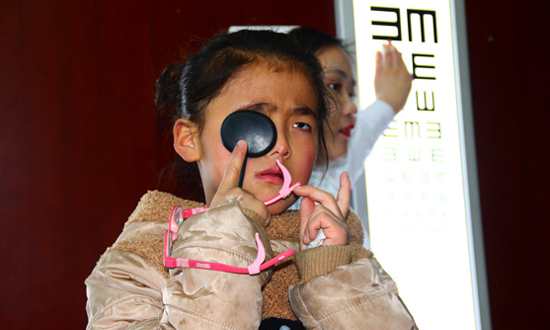导读:据世卫组织一项报告称,中国近视率全球第一,其中高中生和大学生群体近视率达到了70%,而小学生近视率也接近40%。

Feifei, an 11-year-old boy from Xuzhou, Jiangsu Province, suffered from a sudden acute eye disease which has almost led to blindness. The whole ailment was caused by excessive eye fatigue during the winter vacation, during which he played computer games for a continuous 10 days and nights.
飞飞是一名来自江苏徐州的11岁男孩,他突患眼疾,差点导致双眼失明。这个情况时由于他在寒假期间急性眼疲劳引起的,他曾10昼夜不间断得玩电脑游戏。
Many youngsters in China nowadays are increasingly indulged in computer games and other electronic products, and are unable to extricate themselves. this is followed by a series of health problems, with the most typical case being myopia, or nearsightedness.
中国许多年轻人日渐沉迷于电脑游戏和其他电子产品而不能自拔。这导致了一系列健康问题,其中最典型的就是近视。
According to the latest research report released by the World Health Organization (WHO), the nearsightedness rate among Chinese juveniles ranks first in the world - 70 percent of high school and college students. The rate is nearly 40 percent in primary school students, while it is only 10 percent for their peers in the United States.
据世卫组织发布的最新报告显示,中国青少年近视率是全世界最高的——高中生和大学生群体近视率达到了70%。小学生近视率也将近40%,而美国同龄人的近视率只有10%。
The WHO research report says that the number of nearsighted people in China has reached 600 million, nearly approaching half of the country’s total population.
世卫组织报告称中国近视人数已达6亿人,几乎是全国人口的一半。
Experts attribute the soaring nearsightedness rate in China to the unhealthy lifestyles and learning styles which parents impose on their children.
专家认为,中国近视率飙升和父母强加给孩子的不健康生活和学习方式有关。
On the one hand, to achieve high scores in exams, children spend too much time indoors studying and have not enough time outside in the sunlight. On the other hand, a growing number of high-tech products, such as smart phones and tablet PCs, make children focus their eyes and attention on fluorescent screens for long periods of time, resulting in excessive eye fatigue.
一方面,为求考试高分,孩子们花了太多时间在室内学习,在户外阳光下的活动不足。另一方面,智能手机和平板电脑等越来越多的高科技产品使得孩子们的眼睛和注意力长时间集中在荧光屏上,导致眼睛过度疲劳。
Experts suggest that youngsters maintain a proper balance between study and rest so as to protect their eyesight, and parents should play a correspondingly active role in the process.
专家建议青少年应该在学习和休息之间保持适度平衡,从而保护他们的视力,而父母也应在这个过程中发挥相应的积极作用。







